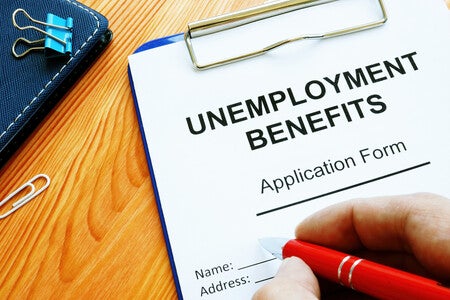This week, federal unemployment benefits ended, leaving millions of Americans without benefits. According to The Century Foundation, 7.5 million workers could be negatively impacted once benefits end after Labor Day.
This loss comes on the heels of a disappointing jobs report and as the spread of the delta variant continues to impede economic recovery. So for Americans who have seen their benefits reduced or taken away altogether, what are the next steps?
Unemployment benefits were a lifeline for millions of Americans
In March 2020, federal unemployment benefits were put in place under the CARES Act. The U.S. was in the midst of a rapid economic downturn, and millions of Americans were laid off due to shutdowns related to COVID-19.
The CARES Act raised unemployment benefits to $600 per week and provided aid to self-employed workers that are usually ineligible for state benefits. Weekly unemployment benefits were eventually reduced to $300.
Congress extended the program twice over the last year but has opted out of extending it a third time. And 26 states chose to end these benefits prematurely, arguing that for many, extended unemployment benefits could be a disincentive to work. However, many economists have argued against this idea.
What benefits will be ending?
There are several different types of federal benefits ending this week. The first is the Federal Pandemic Unemployment Compensation, which provides a $300 weekly employment benefit. It was initially $600 per week and helped out-of-work Americans make up for lost wages.
The Pandemic Emergency Unemployment Compensation provided financial relief to individuals who had already maxed out their unemployment benefits. The exact timeline varied by state, but most lasted 26 weeks.
And finally, the Mixed Earners Unemployment Compensation provided $100 per week to individuals who split their time as employees and independent contractors. According to White House officials, these federal benefits were intended to be temporary and will not be extended past Labor Day.
Struggling Americans still have options
The conclusion of the federal unemployment benefits comes at a difficult time for many people. The Supreme Court recently overturned the eviction moratorium, putting many people at risk for eviction.
And in August, the U.S. added just 235,000 new jobs, falling far short of the expected 720,000. However, there are still options available for Americans trying to get back on their feet:
- State eviction protections: The federal eviction moratorium ended, but many states have local moratoriums in place. For instance, New York, California, and Illinois all have eviction bans in place. In addition, renters can apply for rental assistance — the exact benefits vary by state.
- SNAP benefits: In October, the Supplemental Nutrition Assistance Program (SNAP) benefits will increase by 25%. This increase will help a lot of low-income families with children. In addition, schools will offer universal free meals to all students.
- Child tax credits: In July, the IRS and Department of the Treasury began sending advanced monthly payments to eligible families. The enhanced child tax credit increased from $2,000 to $3,000 and added a $600 bonus for children under six.
In addition, many companies are still struggling to hire workers. And some companies, like Amazon and Chipotle, are raising their wages or offering signing bonuses in an effort to attract new employees. So there could be a lot of opportunities available to qualified workers in the coming months.
Disclaimer: The information and insights in this article are provided for informational purposes only, and do not constitute financial, legal, tax, business or personal advice from National Business Capital and the author. Do not rely on this information as advice and please consult with your financial advisor, accountant and/or attorney before making any decisions. If you rely solely on this information it is at your own risk. The information is true and accurate to the best of our knowledge, but there may be errors, omissions, or mistakes.

